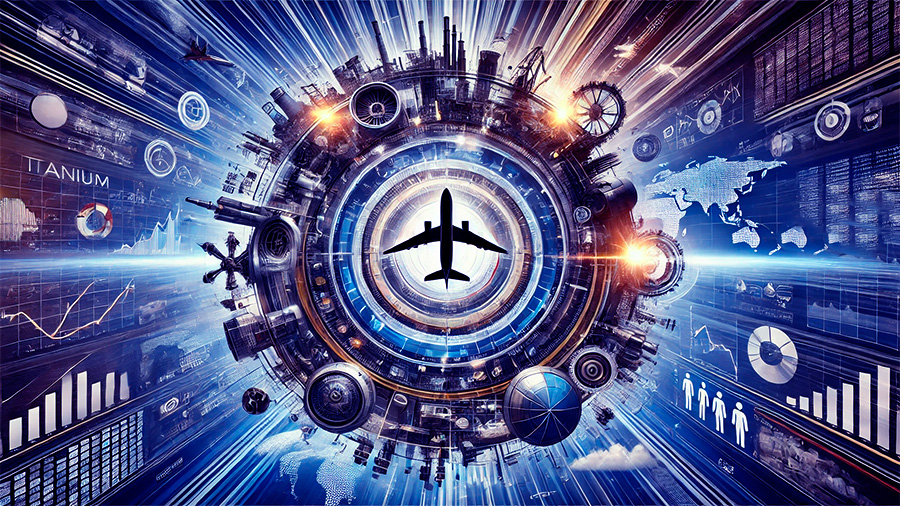Titanium, a strong yet lightweight metal, is crucial in modern aerospace technology. Its unique properties make it indispensable for the construction of aircraft, spacecraft, and other advanced aerospace components. The demand for titanium in aerospace has significant economic implications, influencing not just the aerospace industry itself but also national economies and global trade. This article explores how titanium is driving innovation in aerospace technology and creating ripple effects throughout various industries and economies.
The Importance of Titanium in Aerospace
Titanium’s exceptional strength-to-weight ratio, resistance to corrosion, and ability to withstand extreme temperatures make it an ideal material for aerospace applications. Whether used in jet engines, structural components, or space exploration systems, titanium helps ensure that aircraft and spacecraft are both durable and efficient. These properties make titanium critical for high-performance technologies that are at the forefront of aerospace innovation.
1. Titanium’s Unique Properties
Titanium stands out from other metals due to its combination of strength, low weight, and resistance to corrosion. These qualities make it ideal for aerospace applications where performance, fuel efficiency, and safety are paramount.
Key properties of titanium that benefit aerospace:
- High strength-to-weight ratio: Titanium is incredibly strong yet much lighter than steel, allowing for more efficient fuel consumption and greater payload capacity in aircraft and spacecraft.
- Corrosion resistance: Titanium is highly resistant to corrosion from harsh environments, including extreme temperatures, moisture, and chemicals, making it ideal for use in aircraft exposed to air, fuel, and weather elements.
- High-temperature tolerance: Titanium can withstand the extreme temperatures encountered in jet engines and rocket propulsion systems, ensuring the longevity and reliability of aerospace components.
2. The Role of Titanium in Aircraft Manufacturing
Titanium is used extensively in the aerospace industry to manufacture various components of both civilian and military aircraft. Its light weight helps reduce fuel consumption, which is a key consideration for both commercial airlines and military operations. Aircraft manufacturers are increasingly using titanium to replace heavier materials like steel and aluminum in critical parts.
Applications of titanium in aircraft manufacturing:
- Engine components: Titanium alloys are used in high-stress parts of jet engines, such as compressor blades, turbine blades, and casings, where high strength and heat resistance are essential.
- Structural components: The fuselage, wings, and tail sections of modern aircraft often incorporate titanium due to its lightness and strength, which helps reduce the overall weight of the aircraft and improve fuel efficiency.
- Landing gear: Titanium is used in the landing gear of aircraft, where strength and durability are crucial to withstand the stresses of takeoff and landing.

The Economic Ripple Effects of Titanium in Aerospace
The widespread use of titanium in aerospace not only benefits the industry itself but also has far-reaching economic implications. The demand for titanium drives innovation in various sectors, creates jobs, and stimulates national and global economies. Governments, aerospace companies, and suppliers benefit from the growth of this critical material, making it a key driver of economic activity.
1. Stimulating Global Trade and Industry Growth
The aerospace sector is one of the largest consumers of titanium, driving demand for the metal across the globe. Titanium mining and production are integral to the aerospace supply chain, and the global demand for titanium products has encouraged the growth of mining operations in countries rich in titanium reserves. As a result, titanium plays a significant role in global trade, particularly in countries that export aerospace products and materials.
Global impact of titanium in aerospace:
- Export growth: Countries with strong aerospace sectors, such as the United States, Russia, China, and several European nations, benefit from the export of titanium-based products and aerospace components, contributing to national economies.
- Supply chain development: The titanium supply chain, from mining and refining to manufacturing and assembly, creates jobs and stimulates industries such as metallurgy, transportation, and logistics.
- Technological innovation: As demand for titanium grows, it drives advancements in material science, leading to innovations not only in aerospace but also in other industries such as defense, automotive, and medical technology.
2. Economic Growth and Job Creation in Mining and Manufacturing
The aerospace sector’s demand for titanium has led to an expansion of mining and manufacturing operations, especially in countries with large titanium reserves. This growth creates jobs and stimulates local economies, particularly in areas where titanium is mined and processed. Additionally, the manufacturing of titanium alloys and aerospace components generates high-paying jobs in engineering, research, and production.
Economic benefits of titanium mining and production:
- Job creation: The titanium mining and refining process involves a wide range of skilled workers, from miners and engineers to machine operators and metallurgists. The aerospace industry also requires thousands of workers in manufacturing and assembly.
- Infrastructure investment: The growth of titanium mining operations often leads to infrastructure development in local communities, including roads, utilities, and research facilities, benefiting other sectors of the economy.
- Boosting related industries: Titanium demand stimulates growth in related industries such as electronics, automotive, and medical devices, where titanium is used for high-performance applications.
3. Government Policy and Economic Strategy
Governments recognize the strategic importance of titanium, particularly in aerospace, and have developed policies to support its production and use. This includes subsidies for titanium mining, tax incentives for aerospace manufacturers, and research funding to develop new titanium-based technologies. These efforts ensure that countries with significant aerospace industries maintain a competitive edge in the global market.
Government policies supporting titanium production and aerospace:
- Research and development incentives: Governments often provide funding for R&D in titanium alloys and advanced manufacturing processes, encouraging innovation and improving the performance of titanium in aerospace applications.
- Trade agreements: Trade agreements between countries can support the aerospace industry by ensuring the smooth flow of titanium and titanium-based products across borders, which is crucial for global supply chains.
- Defense contracts: Many governments also use titanium in defense projects, which helps drive further demand and economic growth in the aerospace sector.

Challenges and Future Outlook for Titanium in Aerospace
While titanium has become a cornerstone of aerospace technology, challenges remain in its production and supply. Mining titanium requires significant energy and environmental resources, and as demand grows, the industry must find sustainable ways to meet the needs of aerospace manufacturers. Additionally, there is a need for innovation in the recycling of titanium to ensure a steady supply and reduce the environmental impact of production.
1. Environmental Concerns and Sustainability
Titanium mining can be resource-intensive and environmentally damaging, raising concerns about the long-term sustainability of its production. However, advances in technology and recycling efforts are helping to reduce the environmental impact of titanium mining.
2. The Role of Innovation in Reducing Costs
As the aerospace industry continues to grow, innovation in titanium production and manufacturing is critical for reducing costs and improving efficiency. New processes for extracting and processing titanium, along with innovations in alloy development, will help ensure that titanium remains an affordable and sustainable material for aerospace applications.
Conclusion
Titanium plays a central role in the aerospace industry, driving innovation, supporting technological advancements, and contributing to economic growth. Its unique properties make it indispensable for manufacturing high-performance aircraft and spacecraft, while its demand stimulates global trade, creates jobs, and encourages government investment in infrastructure and research. As the aerospace sector continues to grow, titanium will remain a key player in shaping the future of aviation, space exploration, and beyond, offering both technical and economic benefits to national and global economies.


